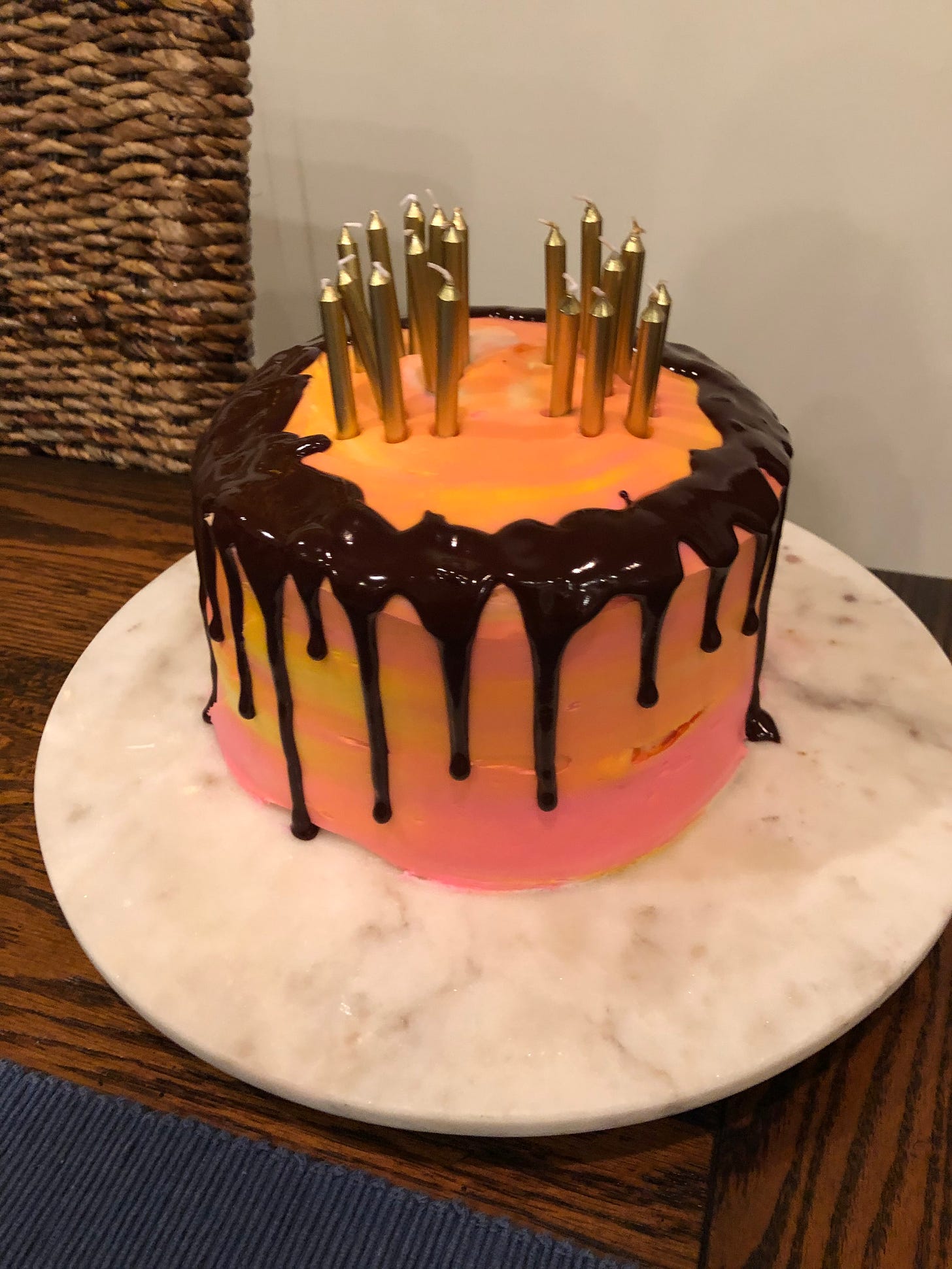If you start to criticize your body when you see or feel it, stop yourself. Then say this: “2024 is the year of the tummy.”
It’s declarative. Authoritative. Let it shut down your self-critique.
The year of the tummy. I like the word “tummy” because it’s plain. It isn’t “abs” or “waist” or any other word that implies that smaller is better. It’s friendly; it hasn’t been sexed up.
“Tummy” is a kid word, from a time when your body existed only for practical purposes. It’s soft. For a tummy to be a proper tummy, it must be round, pushing out against waistbands, rolling over underwear, soft and obtrusive and allowed.
Childhood is the last time a female human is allowed to have a tummy. A five-year-old girl with a big, round belly is adorable. Once she’s older, her tummy is perceived as an indication of bad parenting or no self-control. It becomes something she should disguise with clothes or disappear with starvation.
I somehow grew up innocent of many of the insecurities assigned to women’s bodies, but even I knew that stomachs were supposed to be small. When I had my eating disorder, my distorted eyes zeroed in on my stomach alone. I clocked the day I was better because I looked at my stomach in the mirror and just saw it there. I found myself observing it neutrally. It had been years since I’d looked at my tummy with anything besides criticism. I knew then that I was what I didn't think I’d ever be—better.
I’d thought I’d have my eating disorder forever. It was so controlling and dominating and I was working and working on it but held almost no hope that it would ever actually go away completely. The story of the months of working to heal is interesting, but it’s not the story for this post. Once I outlived something I thought I’d be stuck with forever, I decided I was a woman who deserved to take up space. I would never again spend my life trying to make myself disappear.
Those two sentences became part of my values system:
I am a woman who deserves to take up space in this world.
I will never again spend my life trying to make myself disappear.
For years, I have said these sentences to myself to remind myself what is true.
I tell myself these sentences when people around me declare that carbs are bad or this cookie is their third or their snack reminds them that they need to lose eight pounds.
Have another one, I want to say. It’s a cookie. It’s for eating.
Actually, I want to say: Please, keep your toxic perspectives on food between yourself and your therapist. I don’t want to be responsible to think of a polite reply to you verbally processing diet culture over this cookie I baked for you because I love you. And really, you’re not processing anything. You’re repeating unoriginal, socially programmed diet culture lines. Diet culture lies.
Please, decide in your own mind what to eat, then do that. Cut the verbal penance. If you need to explain to a roomful of people why you’re eating some food even though you already ate some food, the cookie is not the problem. You need to work on your relationship to food. Journal about it, read work by fat activists about fat bodies, talk to a therapist who cares about reducing anti-fat bias.
There are many elements in any conversation about food and weight. Today, I’m interested in two: first, messages we absorb from our surroundings about our body. Second, messages we tell ourselves about our body.
The messages we get from the world around us do matter. Control the messages you absorb from others as much as possible. Sit down and design your social media experience: include people who have fat bodies and disabled bodies. Include people who talk about reducing anti-fat bias. Remove people whose photos convince you that you’re too big. Honestly, unfollow anyone, even they’re an acquaintance or friend. Instagram is a fake world. Your mindset is more important than online decorum. You can be kind to them in real life.
This is tricky. I don’t want to dismiss how difficult it is to ignore cultural conditioning. And I absolutely recognize that cultural standards around weight have real effects on real lives.
The messages we get from the world matter because they influence the messages we tell ourselves. The power of “The Year of the Tummy” is that it pretends to be a message from the world, while really it’s a message from you. You’re stating that your body is correct to have a tummy, and you’re saying it in an communal, authoritative way. The declaration is invented by me, for me. And you. Say it below your breath, now, as you read, wherever you are: 2024 is the year of the tummy.
Speak kindly to yourself about yourself. You’re advocating for someone you care about. Notice eating-disorder-laced words. Abhor anti-fat bias you encounter. Ice Spice shared a picture of herself, tummy on display. People thought she was pregnant. She was like, nope. That’s just me. And I thought—yes, Ice Spice! 2024 is the Year of the Tummy!
Trend-inspired language lends the statement power, sure. It implies that someone else has handed you this fact, and your body is pre-approved. But making the tummy sound like a trend can be a problem if taken too far because trends are limiting—is only this year the year of the tummy? Human body parts are often problematically made trendy or un-trendy. Audrey Hirsch has a fantastic comic about this. But for pep-talk purposes, this lil statement works. I’ll update it for next year, and the next, and the next. On January 1st: 2025 is the Year of the Tummy.
The tummy. It’s not lost on me that we need food to fuel our lives, so we eat food, and it moves through our stomach, so our inside is working hard and doing the thing and we’re on the outside looking at the external skin like would you just be concave please?? Honey no! The enzymes must zyme! The acids must chomp! The nutrients must be gathered! The stomach ought to expand as needed and be encouraged to do so!
I will never again spend my life trying to make myself disappear.
I am a person who deserves to take up space in the world.
2024 is the Year of the Tummy.
Further reading:
This article about reclaiming “fat” as a neutral, descriptive term
This list of books about reducing anti-fat bias
This overview of portrayals of the female body in art









YES - thank you so much! The temps have been higher lately (and therefore my body is more “on display”). After reading this piece I feel more at home with my tummy just simply being itself!